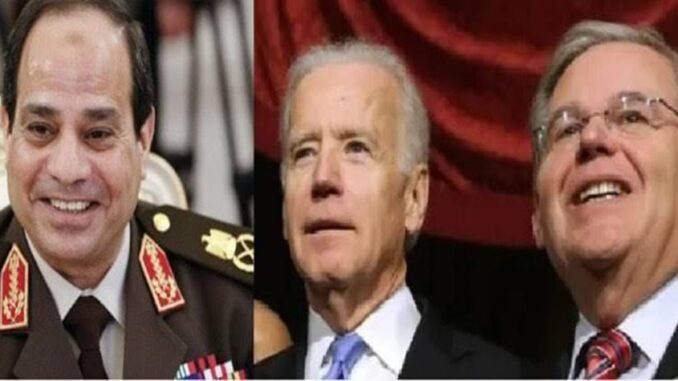
The federal corruption indictment against the New Jersey Democrat comes just over a week after the Biden administration said it would release restricted military aid to Egypt.
US military assistance to Egypt is facing increased scrutiny following allegations that Sen. Bob Menendez used his influence in Congress to secretly aid the government of Egypt’s Abdel Fattah al-Sisi, states Elizabeth Hagedorn.
Human rights groups say the charges against Menendez, if true, have tainted aid dollars approved by the administration earlier this month. Speaking on condition of anonymity, two congressional sources told Al-Monitor that Democratic offices are discussing options, including placing a hold on a recently greenlit tranche of military aid to Egypt.
The longstanding US partner in the Middle East has been among the biggest recipients of American security assistance since the 1978 Camp David Accords between Israel and Egypt. That provision of aid — to the tune of roughly $1.3 billion per year — has continued despite the country’s poor record on human rights.
On Friday, federal prosecutors in Manhattan charged Menendez and his wife, Nadine, with accepting bribes including cash, gold bars and a Mercedes-Benz convertible in exchange for using the 69-year-old senator’s office “in ways that benefited the government of Egypt.”
Menendez has pledged to fight the bribery charges and has rebuffed calls from a growing number of Democrats to resign. On Monday, the senator rejected the Justice Department’s allegations and defended his “clear and consistent” record on holding Egypt accountable.
“Those who now are attempting to malign my actions as it relates to Egypt simply don’t know the facts,” Menendez said in public remarks in Union City, NJ.
The 39-page indictment contains an explosive list of allegations involving Menendez and Wael Hana, an Egyptian-American businessman who prosecutors said had close ties to Egyptian military and intelligence officials.
According to the three-count indictment, Nadine Menendez and Hana arranged a series of meetings between the senator and Egyptian officials that included discussions of US foreign military financing to Egypt.
Federal prosecutors say Menendez disclosed “nonpublic information” to Hana during a May 2018 dinner about the US supply of military aid to Egypt. Shortly after their dinner, Hana texted an unidentified Egyptian official claiming that “the ban on small arms and ammunition to Egypt has been lifted.”
Later that month, Menendez allegedly ghost-wrote a letter to other US senators on behalf of Egypt asking that they release a hold on $300 million in assistance, the indictment said.
As chairman of the Senate Foreign Relations Committee since 2021, Menendez’s buy-in was needed to move forward with major arms sales to foreign governments. Under the arms sales process, the State Department informally notifies the chairs and ranking members on the House and Senate foreign affairs panels, who can then provide input and place holds on the proposed transfers.
Menendez has used this authority to obstruct transfers to Turkey and Saudi Arabia over human rights concerns, but did not publicly announce holds on Egypt’s military sales. On Monday, he indicated he did so privately.
Menendez has stepped down from the committee chairmanship, as required by Senate Democrats’ internal rules. Sen. Ben Cardin (D-Md.), an outspoken critic of the Sisi government who has pushed for restrictions on Egypt’s aid, is expected to temporarily assume the role.
Since coming to power in a 2013 overthrow of Egypt’s first democratically elected president, Sisi has waged what monitoring groups say is a sweeping crackdown on dissent that has seen tens of thousands of Egyptians arrested or jailed on political grounds.
During the time prosecutors say Menendez accepted bribes to assist the government of Egypt, American citizens and lawful permanent residents were detained in the North African country’s jails. They include Mustafa Kassem, an Egyptian-born auto parts dealer from New York, who died in January 2020 after launching a hunger strike to protest his imprisonment.
In response to Cairo’s repression, Congress since 2014 has placed human rights-related conditions on a fraction of its military assistance. Successive US administrations have bypassed some of those restrictions, citing Egypt’s role in supporting counterterrorism and regional stability, including as a mediator between Israel and Palestinian militants.
Sen. Chris Murphy (D-Conn.), Cardin and eight other senators wrote to Secretary of State Antony Blinken in August urging the Biden administration to slash $320 million from Egypt’s annual assistance package — the full amount that Congress in its annual appropriations legislation had tied to human rights progress. A source with knowledge of the letter said Menendez passed on signing it.
The unsealing of the Menendez indictment came just over a week after the administration said it would withhold just $85 million in assistance from Egypt this year. Blinken used a national security waiver to override the human rights conditions that lawmakers had attached to the remaining $235 million in restricted funds.
“The secretary made a very carefully thought-through evaluation of certain national security priorities … contributions Egypt was making and will continue to make,” the State Department’s top-ranking Middle East diplomat, Barbara Leaf, said at Al-Monitor and Semafor’s inaugural Middle East Global Summit on Sept. 20.
But human rights advocates now say that military aid should be re-examined in light of the Menendez accusations. The Freedom Initiative, a Washington-based group that advocates for Middle East political prisoners, said President Joe Biden should announce a review of the bilateral relationship with Egypt, and Congress should place an immediate hold on the $235 million approved earlier this month.
On Tuesday evening, Murphy told reporters that he believed Menendez should resign, and the aid should be paused pending an investigation.
Blinken on Friday declined to comment on such calls, citing an “ongoing legal matter.”
Holding up military aid to Egypt is not without precedent. Last year, Sen. Patrick Leahy (D-Vt.), then-chairman of the Senate Appropriations Committee, blocked the release of $75 million to Egypt over its treatment of political prisoners. The funds were returned to the Treasury Department after his office and the State Department failed to agree on a new set of rights conditions for Egypt.
Seth Binder, director of advocacy at the Project on Middle East Democracy, said the allegations in the Menendez indictment put to rest the idea that Egypt’s government doesn’t care about US military aid.
“It’s clear that their involvement and effort in trying to push to get military aid cleared and released is an indication that this is absolutely something they care strongly about, and they’re willing to do whatever they can to get the assistance that they think belongs to them,” Binder said.



